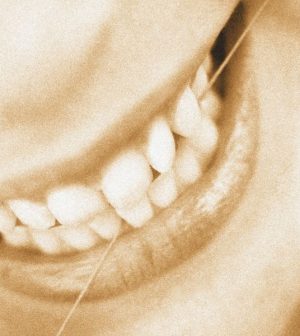- Recognizing the Signs of Hypothyroidism
- 10 Strategies to Overcome Insomnia
- Could Artificial Sweeteners Be Aging the Brain Faster?
- Techniques for Soothing Your Nervous System
- Does the Water in Your House Smell Funny? Here’s Why
- Can a Daily Dose of Apple Cider Vinegar Actually Aid Weight Loss?
- 6 Health Beverages That Can Actually Spike Your Blood Sugar
- Treatment Options for Social Anxiety Disorder
- Understanding the Connection Between Anxiety and Depression
- How Daily Prunes Can Influence Cholesterol and Inflammation
Bleeding Gums? You Might Be Lacking Vitamin C

If you have bleeding gums, you may need to increase the amount of vitamin C in your diet, a new study suggests.
The American Dental Association says bleeding could be a sign of gingivitis, an early stage of gum disease. These new findings from University of Washington (UW) researchers suggest you should also check your vitamin C intake.
“When you see your gums bleed, the first thing you should think about is not, I should brush more. You should try to figure out why your gums are bleeding. And vitamin C deficiency is one possible reason,” said study lead author Dr. Philippe Hujoel. He’s a dentist and professor of oral health sciences at the UW School of Dentistry, in Seattle.
For the study, the researchers analyzed results of 15 clinical trials from six countries that included more than 1,100 participants, and data from more than 8,200 participants in the U.S. National Health and Nutrition Examination Survey.
Bleeding of the gums on gentle probing and bleeding in the eye (retinal bleeding) were associated with low vitamin C levels in the blood, and boosting daily intake of vitamin C helped reverse those issues, according to findings published Feb. 1 in the journal Nutrition Reviews.
Both gum bleeding and retinal bleeding could be signs of a microvascular bleeding tendency in the brain, heart and kidneys, Hujoel noted.
But these findings don’t suggest that reversing gum bleeding by increasing vitamin C intake will prevent stroke or other serious outcomes, he stressed.
The findings do indicate that vitamin C recommendations designed primarily to protect against scurvy — a deadly disease caused by extremely low vitamin C levels — are too low. These levels can lead to gum bleeding.
Hujoel said people should get sufficient vitamin C intake by eating non-processed foods such as kale, peppers or kiwis. If you can’t find vitamin C-rich foods that you like, consider a supplement of about 100 to 200 milligrams a day, he advised.
More information
The Harvard School of Public Health has more on vitamin C.
SOURCE: University of Washington, news release, Feb. 1, 2021
Source: HealthDay
Copyright © 2026 HealthDay. All rights reserved.










